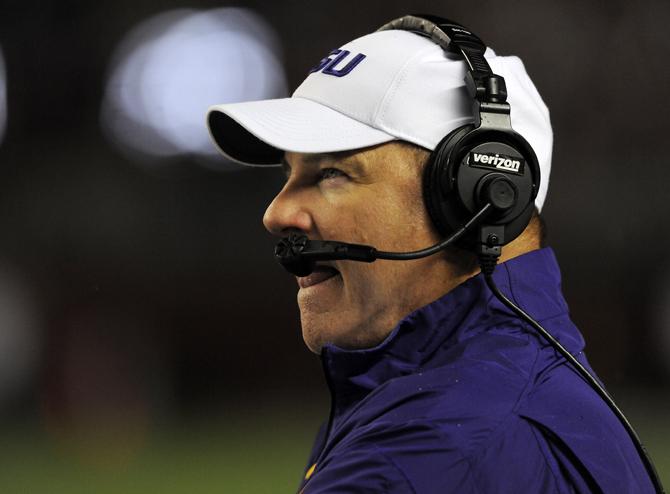Some of LSU’s most visible figures — ranging in age from 6 to 16 — were among those alive to hear the news of President John F. Kennedy’s death 50 years ago. Four of them took time this week to describe how the tragic day affected them and what they remember from it.
Les Miles, LSU football coach, age 10 in 1963
LSU football coach Les Miles was a young boy in Ohio when the news came of the president’s assassination. His class was immediately sent home for fear that America was under attack as part of the Cold War’s nuclear threat.
“We were concerned about what was normal and what was going to be tomorrow,” Miles remembered.
His dad tried to explain the politics of it and they watched the news coverage on a black and white television, but Miles’ 10-year-old spirit got the best of him.
“And then I played in autumn leaves in the ditch, and played ‘Army’ for the rest of the time,” he said.
50 years later, Miles grinned at the media as he proclaimed his “social relevance” for having lived through the Kennedy assassination.
“It was tremendously significant,” he said. “It became more significant years and years and years afterward.”
Stuart Bell, executive vice chancellor and provost, age 6 in 1963
Executive Vice Chancellor and Provost Stuart Bell grew up about 200 miles west of Dallas in Abilene, Texas, so the news of Kennedy’s assassination hit him and his family especially hard. Only 6 years old at the time, knowing that something so terrible could happen in a place so close to home lingered with Bell.
“There was probably not a positive feeling as someone growing up in Texas to know this was something that happened in the state,” he said.
Though his family didn’t usually watch a lot of television, Bell remembered coming home from his first grade class and his parents watching their black-and-white TV. The family crowded around it for the next several days.
“I do remember a lot of the coverage and the seriousness of what was on television,” he said.
Bell’s school flew its flag at half-mast, and he called the period a time of introspection. He’d been to Dallas several times before, and his family visited Dallas after the assassination and stopped to see the spot where Kennedy had been assassinated.
The 50th anniversary is a time to remember Kennedy’s great leadership, exemplified in his popular speeches, Bell said. Kennedy’s famous inaugural address, where the president told the American people, “ask not what your country can do for you — ask what can you do for your country,” is one of Bell’s favorites.
“We lose the feeling that we can make a difference in the world as an individual,” Bell said. “Certainly, that was his message.”
Paul Mainieri, LSU baseball coach, age 6 in 1963
LSU baseball coach Paul Mainieri came from a Catholic family in Miami, Florida, and his dad was proud to have the first and only Catholic president in office. He remembers lots of commotion happening at his Catholic elementary school when the news broke.
“I can never forget November 22, 1963,” he said.
Mainieri was just 6 years old, but vividly recalls watching famed CBS Evening News anchor Walter Cronkite deliver the news of the president’s death. The next day, Mainieri and his family watched Dallas nightclub owner Jack Ruby kill alleged assassin Lee Harvey Oswald live on national television.
He also especially remembers watching the funeral procession, where the commentators explained that the riderless horse trotting behind Kennedy’s casket signified a fallen leader.
“I would say that it’s the most memorable event in our nation’s history other than the birth of our nation and the Civil War,” Mainieri said.
Despite the time that’s passed, Mainieri said the conspiracy theories have built up the mystique surrounding the assassination.
“I don’t think there’s been anything done to squelch those theories,” he said. “…I don’t know if we’ll ever have the answers.”
Jack Hamilton, Manship professor and former provost, age 16 in 1963
Former LSU provost and Manship School of Mass Communication professor Jack Hamilton was a junior at a Catholic military school in Illinois in 1963. Whenever the news of Kennedy’s assassination spread, the priests told all of the students to get down on their knees and pray.
Hamilton wasn’t Catholic, but he joined them anyway.
In those days, Hamilton didn’t consider himself to be political. But he cared that the president had been shot, and looking back, he can trace how the Vietnam War, the Great Society Program and other events would have been different if not for that day.
“There are all kinds of ways history could have changed,” he said.
The anniversary is a time for Americans to remind themselves of trends in history, Hamilton said.
The marker of 50 years means many people still remember the tragedy. But Hamilton pointed out that people don’t still speculate often about former President William McKinley’s assassination in 1901.
“For us, the Kennedy story is still fresh,” he said.
University administrators and coaches recall memories of JFK’s assassination
By Andrea Gallo
November 21, 2013
LSU head coach Les Miles watches a replay Saturday, Nov. 9, 2013 during the Tiger’s 38-17 loss to the Alabama Crimson Tide at Bryant-Denny Stadium in Tuscaloosa, AL.





